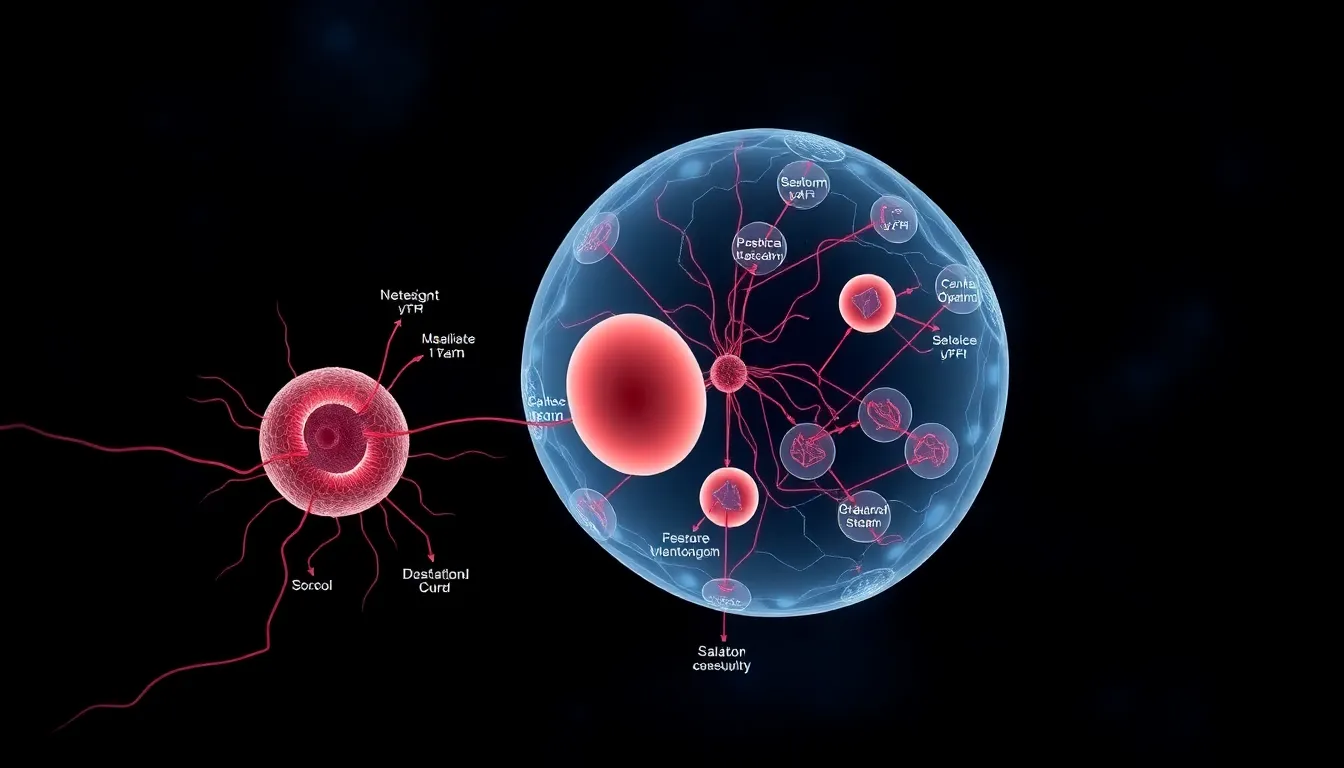Mitosis signaling pathways are the central regulators of cell division, a fundamental process of life. These pathways ensure that cells divide accurately, maintaining genomic integrity and preventing disease. The complexity of these pathways highlights the intricate mechanisms that govern cellular behavior.
On This Page
Read More
The intricate dance of cell division, a process known as mitosis, is not merely a mechanical event but a finely orchestrated cascade of molecular interactions. The fidelity of this process is crucial, as errors can lead to genomic instability and diseases like cancer. The orchestration of this process is managed by intricate mitosis signaling pathways, which act as conductors of this cellular symphony. These pathways ensure that each step, from chromosome condensation to cell separation, occurs with remarkable precision.
Decoding the Complexity of Mitosis Signaling Pathways
Mitosis signaling pathways are the core mechanisms that control the various stages of cell division. These pathways are not static; they dynamically respond to internal and external cues, ensuring that the cell divides only when conditions are optimal. This responsiveness is critical for maintaining cellular health and preventing the propagation of errors. Understanding these pathways is not only a biological endeavor but also a key to therapeutic interventions.
The Role of Kinases in Mitosis
Kinases, a diverse group of enzymes, are central players in the mitosis signaling pathways. These enzymes function by adding phosphate groups to proteins, a process known as phosphorylation, thereby modifying their activity. This phosphorylation acts as a switch, turning proteins on or off, thereby controlling the progression of mitosis. Kinases such as cyclin-dependent kinases (CDKs) and Aurora kinases are critical regulators of cell cycle checkpoints, ensuring that each phase of mitosis is completed correctly.
CDKs, activated by cyclins, are essential for the initiation and progression of the cell cycle. They trigger events such as DNA replication and chromosome condensation. Aurora kinases, on the other hand, are involved in spindle assembly and chromosome segregation. They orchestrate the formation of the mitotic spindle, a structure essential for separating chromosomes during cell division. The precise regulation of these kinases is vital for maintaining genomic stability.
Dysregulation of kinases can lead to errors in mitosis, resulting in aneuploidy, a condition where cells have an abnormal number of chromosomes. This is a hallmark of many cancers. The study of kinase activity and its regulation is therefore crucial for understanding the mechanisms of cancer development and for designing targeted therapies. Inhibitors that specifically target these kinases are being developed to disrupt the uncontrolled cell division in cancer cells.
Key Signaling Cascades in Mitosis
Multiple signaling cascades work in concert to ensure the successful execution of mitosis. These pathways involve a series of molecular interactions, where signals are relayed from one molecule to another, ultimately affecting cellular behavior. The intricate interplay of these cascades ensures the precision and fidelity of cell division. Understanding these pathways is crucial for both basic research and the development of therapeutic interventions.
The MAPK Pathway and Mitosis
The Mitogen-Activated Protein Kinase (MAPK) pathway is a highly conserved signaling cascade that plays a crucial role in cell growth, differentiation, and mitosis. It is activated by a variety of extracellular signals, such as growth factors. The MAPK pathway transmits signals from the cell surface to the nucleus, where it regulates gene expression. This pathway is essential for the proper execution of mitotic events.
In mitosis, the MAPK pathway is involved in regulating the activity of various proteins that control spindle formation and chromosome segregation. The activation of MAPK can influence the activity of kinases like Aurora kinases, further fine-tuning the mitotic process. Dysregulation of the MAPK pathway can lead to errors in mitosis, contributing to genomic instability and cancer development. This pathway is therefore a key target in cancer research and therapy.
The MAPK pathway's involvement in mitosis highlights the interconnectedness of cellular signaling. It illustrates how extracellular signals can influence the fundamental processes of cell division. This pathway's complexity and its involvement in both normal cell function and disease underscore its importance in biological research and drug development. Understanding the nuances of the MAPK pathway is critical for developing effective cancer therapies.
The Role of the APC/C in Mitosis
The Anaphase-Promoting Complex/Cyclosome (APC/C) is a ubiquitin ligase that plays a pivotal role in regulating the metaphase-to-anaphase transition. The APC/C functions by attaching ubiquitin molecules to target proteins, marking them for degradation. This process is essential for the timely progression through mitosis. The APC/C ensures that key regulatory proteins are removed at the appropriate time.
During metaphase, the APC/C is inhibited, preventing the separation of sister chromatids. Once all chromosomes are correctly aligned on the metaphase plate, the APC/C is activated, leading to the degradation of securin and cyclin B. The degradation of securin releases separase, which then cleaves cohesin, the protein complex that holds sister chromatids together. The degradation of cyclin B inactivates CDK, allowing the cell to exit mitosis.
The APC/C is tightly regulated by various factors, including the spindle assembly checkpoint (SAC), which monitors the attachment of chromosomes to the mitotic spindle. Errors in the APC/C pathway can lead to chromosome missegregation, resulting in aneuploidy. This pathway is therefore a critical target for therapeutic interventions aimed at preventing genomic instability. Understanding its complex regulatory mechanisms is essential for developing effective cancer treatments.
The Precision and Accuracy of Cell Division
The precision with which cells divide is a testament to the intricate regulatory mechanisms at play. Errors in mitosis can have dire consequences, leading to genomic instability and disease. The mechanisms that ensure the fidelity of cell division are therefore of paramount importance. Research into these mechanisms provides insights into both normal cellular function and the development of diseases like cancer.
The Role of Checkpoints in Mitosis
Checkpoints are critical surveillance mechanisms that ensure the proper execution of each phase of mitosis. These checkpoints monitor various aspects of the process, such as DNA replication, chromosome alignment, and spindle formation. If errors are detected, the checkpoints halt the cell cycle, allowing time for repairs or triggering cell death if the damage is irreparable. This prevents the propagation of errors.
The spindle assembly checkpoint (SAC) is a critical checkpoint that monitors the attachment of chromosomes to the mitotic spindle. If a chromosome is not properly attached, the SAC sends a signal that prevents the activation of the APC/C, thereby halting the progression of mitosis. The DNA damage checkpoint monitors DNA integrity, arresting the cell cycle if DNA damage is detected. These checkpoints are crucial for preventing the propagation of genetic errors.
The study of checkpoints provides valuable insights into the mechanisms that maintain genomic stability. Understanding these checkpoints is critical for developing therapeutic strategies that target cancer cells. Disrupting checkpoint function can lead to uncontrolled cell division. Conversely, activating checkpoints can be used to enhance the efficacy of cancer treatments. Checkpoints are therefore essential components of the cellular machinery that ensures the accuracy of cell division.
Key Takeaways
The mitosis signaling pathways are a complex network of interacting molecules that orchestrate cell division with remarkable precision. Kinases, such as CDKs and Aurora kinases, play central roles in regulating the various stages of mitosis. Signaling cascades, including the MAPK pathway and the APC/C, ensure that each step of cell division is executed correctly. Checkpoints, like the SAC and DNA damage checkpoints, monitor the process, preventing the propagation of errors. Understanding these pathways is essential for both fundamental biological research and the development of therapeutic interventions. Targeting specific components of these pathways offers promising avenues for cancer treatment. The quest to understand and manipulate these intricate pathways continues, promising further advances in the treatment of diseases caused by errors in cell division.
| Pathway Component | Function in Mitosis |
|---|---|
| Kinases (CDKs, Aurora) | Regulate cell cycle progression, spindle assembly, chromosome segregation |
| MAPK Pathway | Controls spindle formation, chromosome segregation |
| APC/C | Regulates metaphase-to-anaphase transition |
| Checkpoints (SAC, DNA damage) | Monitor DNA integrity, chromosome alignment |
We also Published
RESOURCES
- Signaling Pathways that Regulate Cell Division - PMC
- EGF stimulates the activation of EGF receptors and the selective ...
- Multiple Wnt Signaling Pathways Converge to Orient the Mitotic ...
- A PIM-CHK1 signaling pathway regulates PLK1 phosphorylation ...
- EGF stimulates the activation of EGF receptors and the selective ...
- Targeting the Mitotic Catastrophe Signaling Pathway in Cancer - Mc ...
- Cdc2-mediated Inhibition of Epidermal Growth Factor Activation of ...
- Mitotic regulators and the SHP2-MAPK pathway promote IR ...
- Non-autonomous insulin signaling delays mitotic progression in C ...
- Molecular Mechanisms and Signaling Pathways Involved ... - Frontiers








1 Comment